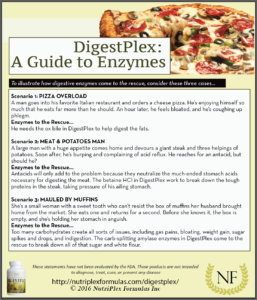Let’s say you live a fairly healthy lifestyle – you exercise regularly, you limit your alcohol intake, you’re able to manage your stress, and your diet comprises predominantly whole foods.
Why, then, when you allow yourself a “cheat” meal at Thanksgiving – at which your partake in so many of the foods you’d never normally eat – do you have to deal with horrific indigestion? You never eat this way; can’t you get a break?
Indigestion – characterized by bloating, acid reflex, flatulence, heartburn, abdominal pain, nausea, and numerous other symptoms – is often the result of eating certain foods, or too many foods, that don’t bode well for the digestive system.
3 Main Categories of Enzymes
There are three main types of enzymes that serve to break foods down into nutrients the body recognizes and cells need to function properly: amylase, which breaks down fats; protease, which breaks down proteins; and lipase, which breaks down carbohydrates.
Because most cooking and/or processing foods kills off most of the enzymes inherent within them, the body has a much tougher time breaking them down completely. This means that not only will the body be able to use all the nutrients originally in those foods (now that they’ve been destroyed), but that it’ll experience numerous symptoms of indigestion – regardless of whether or not the digestive system was working fine before the giant meal.
Eating Too Fast and Overeating
Indigestion can also easily be stimulated by eating too fast or overeating – two habits that have almost come to be expected at meal-centric holidays.
When someone overeats, any enzymes still present in the body or the food are unable to keep up with the digestive load. They then become overwhelmed and cannot properly break down all the food.
Eating too quickly can have a similar effect in that the enzymes present in saliva aren’t given enough time interacting with the food to start breaking it down before it moves along to the digestive tract.
Your Digestion Game Plan for Holiday Meals
- Chew Slowly
- Try to Fill Your Plate with Mostly Whole, Unprocessed Foods
- Take Digestive Enzymes contains foods potent in live protease, amylase, lipase, and other necessary enzymes, to give you extra help when your holiday meal is too tough for your system to handle.

